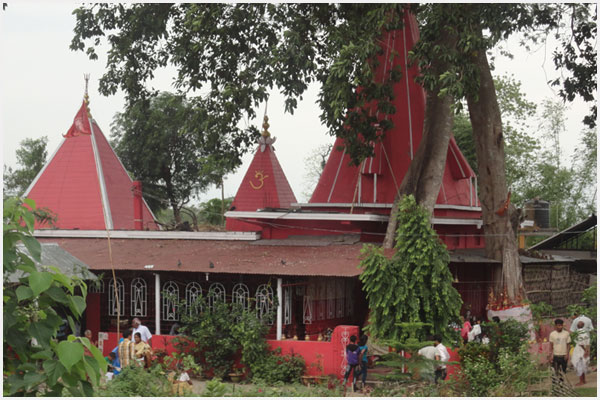Maa Bhramri Temple is lacated at Jalpaiguri in West Bengal. This Temple is dedicated to Goddess Durga and is one among 51 Shakthi peethas.
Tristnota Shakti Peeth, whereon Goddess Shakti left leg fell, takes place.
According to Hindu mythology, there once lived an asura (demon) called Arun asura to set up his kingdom drove out the devas from heavens, and extended his imperial drastically over families of devas e.g. their wives.
The devis (wives of devas), closing theireyes, came to Aruna asura and prayed to Goddess Parmeshwari to save them.As a result, Goddess Parmeshwari, transforming herself into a large bee with a swarm of bees, surrounded the wives of the devas. Then, the bees began to tear the chest of the demons.
The powerless asuras could not fight, and died rapidly. After that, The devis (wives of devas) thanked Parmeshwari Devi for saving their chastity. Therefore, Goddess Parmeshwari got the name of 'Bhramari Devi' as the protector.
Goddess Bhramari Mantra:
Shivaparshvasthita mata shrishaile shubhapithake
Bhramaramba mahadevi karunarasavikshana
Rituals at Bhramari Temple:
Every year in the month of Ashviyja, Navaratri festival will be performed in the Bhramaramba temple.Also, a local festival as namely considered Kumbham is held every year in the month of Chaitra (around April).
Maa Bhramri Temple or Tristnota Shakti Peeth, placed on the banks of Tista River in Shalbari village of Falakata in Jalpaiguri district in West Bengal, means of Goddess Bhramari / Bumblebee (form of Goddess Shakti) and Lord Ishwar (form of LordShiva).
Here, Goddess Bhramari central heart chakra, posessing 12 petals, builds the antibodies to guard humans from disease.
When
Sati, the wife of Shiva, sacrificed herself at the Yajna performed by
her father Daksha, a very distraught Shiva started dancing with her
body. He was dancing the dance of destruction. And the gods said, "Oh,
we are doomed! Shiva is dancing the dance of destruction.
Vishnu took his bow and cut the body of Sati into fifty-one pieces with
his arrows. And wherever a piece of the Divine Mothers body fell on
earth, that place became a Shakti Peetha.
Maa Sati's left leg fell here. Sati is called here Bhramari and Lord Shiva, Ishwar. After partition, this place is called Maa Bhramari Shaktipeeth. This Shaktipeeth is worshipped for Tantra Siddhi (Bhramri Shakti).
Bhramari Devi is a dark Goddess identified as another form of Maa Kalika. It is said that She is "as brilliant as a million dark suns", She is surrounded by black bees and holds black bees in the first of her hands, others of which are in the "boon-granting and "fear-allaying gestures. She destroys egoistic demons while her bees make the Seed-Mantra "Hring.
Do:
- Do pray your Ishta Devata before pilgrimage to Temple.
- Do contact Temple Devasthanam information centre for enquiry, temple information and for Pooja details etc.
- Do reserve your travel and accommodation at Temple well in advance.
- Do bath and wear clean clothes before you enter the temple.
- Do concentrate on God and Goddess inside the temple.
- Do maintain silence and recite your Istamantram to yourself inside the temple.
- Do observe ancient custom and traditions while in Temple.
- Do respect religious sentiments at Temple.
- Do deposit your offerings in the hundi only.
Don't s:
- Do not come to Temple for any purpose other than worshipping of God and Goddess.
- Do not smoke at Temple.
- Do not consume alcoholic drinks at Temple.
- Do not eat non-vegetarian food in the Kshetram.
- Do not approach mediators for quick Darshanam. It may cause inconvenient to others.
- Do not carry any weapon inside the temple.
- Do not wear any head guards like helmets, caps, turbans and hats inside the temple premises.
- Do not perform Sastanga Pranama inside the Sanctum Sanctorum.
- Do not take much time while performing Sparsa Darshanam to God in Garbhagriha.
- Do not buy spurious prasadams from street vendors.
- Do not encourage beggars at Temple.
- Do not spit or create nuisance in the premises of the temple.
